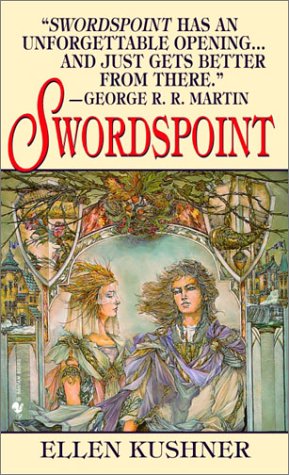I’ve just read all three novels set in Kushner’s Swordspoint universe, and I’ve decided that it makes most sense to write about them separately.
Swordspoint (1987) is a small-scale intimate novel which is fantasy only in that it is set in a world not our own. There is no visible magic whatsoever. The world is a Renaissance one of swordsmen and challenges, nobles and intrigue, jewels and assignations. It begins like a fairytale with snow falling and blood on the snow. It goes on with rapier wits and rapiers, from a duel in Lord Horn’s formal winter-garden to the swordsman’s home above a laundress in the city’s dangerous Riverside slum.
In Swordspoint we always move between decadent plotting nobles and slum-dwelling killers. There’s no in-between. There’s no in-between emotionally either; this alternates between people coolly plotting while sipping chocolate and people passionately engaged. What makes it so unusual as a fantasy novel is that the world is not at stake. Not even the kingdom is at stake. In the plotting of the nobles, none of it really matters. The important story is the personal small-scale one about the swordsman Richard St Vier and his love for the badly-behaved Alec.
Swordspoint is very beautiful, very emotional, and very poised. It was first published in 1987 It’s one of the books that was first called a “fantasy of manners” and remains one of the defining points of the genre. Kushner herself calls it a “melodrama of manners.” When I first read it, in 1987 or 1988, I was entirely astonished by it. What astonished me the most was that there wasn’t, at that time, anything else like it. Fantasy was a group of people going off on a quest and saving the world. And here was this small scale story with a romantic emotional arc, where the romance is between two men.
Richard St Vier is the best swordsman in the world, and Alec is (of course) more than he seems. He’s the heir to the Duchy of Tremontaine, and in the end he has to choose between the duchy and his lover. This personal story comes to a personal conclusion, and if the story is as bright and faceted as a jewel it’s also as small as a jewel. You could slip it onto your finger, or wear it next to your heart.
The real strengths of the book are the excellent characterisations and the beautiful prose. The characters are larger than life and entirely products of their lives and world, but I wouldn’t be surprised to meet any of them. As for the prose, the book begins:
Snow was falling on Riverside, great white feather-puffs that veiled the cracks in the facades of its ruined houses; slowly softening the harsh contours of jagged roof and fallen beam. Eaves were rounded with snow, overlapping, embracing, sliding into each other, capping houses all clustered together like a fairy-tale village. Little slopes of snow nestled in the slats of shutters still cozily latched against the night. It dusted the tops of fantastical chimneys that spiraled up from frosted roofs, and it formed white peaks in the ridges of the old coats of arms carved above the doorways. Only here and there a window, its glass long shattered, gaped like a black mouth with broken teeth, sucking snow into its maw.
Let the fairy tale begin on a winter’s morning, then, with one drop of blood new-fallen on the ivory snow: a drop as bright as a clear-cut ruby, red as the single spot of claret on the lace cuff. And it therefore follows that evil lurks behind each broken window, scheming malice and enchantment; while behind the latched shutters the good are sleeping their just sleeps at this early hour in Riverside. Soon they will arise to go about their business; and one, maybe, will be as lovely as the day, armed, as are the good, for a predestined triumph. . . .
But there is no one behind the broken windows; only eddies of snow drift across bare floorboards. The owners of the coats of arms have long since abandoned all claims to the houses they crest, and moved up to the Hill, where they can look down on all the city. No king rules them any more, for good or ill. From the Hill, Riverside is a tiny splotch between two riverbanks, an unsavory quarter in a prosperous city. The people who live there now like to think of themselves as evil, but they’re really no worse than anyone else. And already this morning more than one drop of blood has been shed.
The blood lies on the snow of a formal winter garden, now trampled and muddy. A man lies dead, the snow filling in the hollows of his eyes, while another man is twisted up, grunting, sweating frog-ponds on the frozen earth, waiting for someone to come and help him. The hero of this little tableau has just vaulted the garden wall and is running like mad into the darkness while the darkness lasts.
…and even though I’ve just finished it, I want to keep on reading. (There’s more of the first chapter on Ellen Kushner’s webpage.)
I love the details of the decadent city, the chocolate whisks, the unlucky play The Swordsman’s Tragedy, the boating parties to see the midwinter fireworks. And I love Richard and Alec, and their relationship—is it love, or is it a duel? And I love it for being what it is and not putting any more weight on what it is than it can bear.
I am not often in the mood for something this mannered. But when I was, for many years there was literally nothing else like it.










